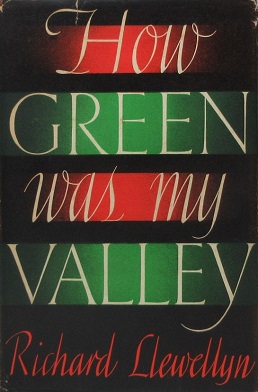Related Research Articles

How Green Was My Valley is a 1939 novel by Richard Llewellyn, narrated by Huw Morgan, the main character, about his Welsh family and the mining community in which they live. The author had claimed that he based the book on his own personal experiences but this was found to be untrue after his death; Llewellyn was English-born and spent little time in Wales, though he was of Welsh descent. Llewellyn gathered material for the novel from conversations with local mining families in Gilfach Goch.

Anglo-Welsh literature and Welsh writing in English are terms used to describe works written in the English language by Welsh writers. It has been recognised as a distinctive entity only since the 20th century. The need for a separate identity for this kind of writing arose because of the parallel development of modern Welsh-language literature; as such it is perhaps the youngest branch of English-language literature in the British Isles.

Dorothy Gladys "Dodie" Smith was an English children's novelist and playwright, known best for the novel The Hundred and One Dalmatians (1956). Other works include I Capture the Castle (1948), and The Starlight Barking (1967). The Hundred and One Dalmatians was adapted into a 1961 animated film and a 1996 live-action film, both produced by Disney. Her novel I Capture the Castle was adapted into a 2003 movie version. I Capture the Castle was voted number 82 as "one of the nation's 100 best-loved novels" by the British public as part of the BBC's The Big Read (2003).

Philippa Gregory is an English historical novelist who has been publishing since 1987. The best known of her works is The Other Boleyn Girl (2001), which in 2002 won the Romantic Novel of the Year Award from the Romantic Novelists' Association and has been adapted into two separate films.

Valley of the Dolls is the first novel by American writer Jacqueline Susann. Published in 1966, the book was the biggest selling novel of its year. To date, it has sold more than 31 million copies, making it one of the best-selling works in publishing history.

Daniel Rowland served as an Evangelist and early on as an Anglican curate. He was one of the foremost figures in the Welsh Calvinistic Methodist revival, along with the evangelist Howell Harris and the hymnist William Williams. For 55 years Daniel Rowland was one of the leading evangelists in Wales.

The Cinema of Wales comprises the art of film and creative movies made in Wales or by Welsh filmmakers either locally or abroad. Welsh cinema began in the late-19th century, led by Welsh-based director William Haggar. Wales continued to produce film of varying quality throughout the 20th century, in both the Welsh and English languages, though indigenous production was curtailed through a lack of infrastructure and finance, which prevented the growth of the industry nationally. Despite this, Wales has been represented in all fields of the film making process, producing actors and directors of note.
This article is about the particular significance of the year 1908 to Wales and its people.
This article is about the particular significance of the year 1836 to Wales and its people.

Allen Raine was the pseudonym of the Welsh novelist Anne Adalisa Beynon Puddicombe, who was born in Newcastle Emlyn. Her novels had sold more than two million copies by 1912.

Anne Beale was a popular English novelist and poet based in Wales. Her poetry, novels and stories appeared in print for over fifty years during her lifetime: "an unusually long career as an author".

Margaret Moore Kennedy was an English novelist and playwright. Her most successful work, as a novel and as a play, was The Constant Nymph. She was a productive writer and several of her works were made into films. Three of her novels were reprinted in 2011.
Henry Solly was an English social reformer. William Beveridge said of him: "He was a restless, inventive, constructive spirit, part author of at least three large living movements; charity organisation, working men's clubs, and garden cities".
A Welsh Singer is a 1915 British silent drama film directed by Henry Edwards and starring Edwards, Campbell Gullan and Florence Turner. It was based on the 1896 novel of the same name by Allen Raine. The screenplay concerns a shepherd who falls in love with a girl.
Marguerite Florence Laura Jarvis, also known under the pseudonym of Oliver Sandys was a British writer, screenwriter, and actress. She used several other names and aliases, such as Countess Barcynska, Hélène Barcynska, Marguerite Florence Barclay, Mrs. Armiger Barczinsky, Caradoc Evans Marguerite, Marguerite Evans, Armiger Barclay, and Marguerite Barclay.
Sarah Winifred Parry was a Welsh writer most known for developing the modern Welsh short story. She became a household name with her serialized fiction in periodicals at the turn of the twentieth century. Her most acclaimed work, Sioned, first published as a serial between 1894 and 1896 was introduced as a novel in 1906 and was reissued in 1988 and 2003.
Mari Griffith was a Welsh radio announcer, as well as a singer, presenter, independent producer and novelist later on in life.
References
- ↑ Evans, D.Roy. "D. Roy Evans Collection" (PDF). The National Library of Wales.
- ↑ "A Welsh Singer (1915)". British Film Institute. Retrieved 7 December 2018.
| | This article about a romance novel of the 1890s is a stub. You can help Wikipedia by expanding it. See guidelines for writing about novels. Further suggestions might be found on the article's talk page. |